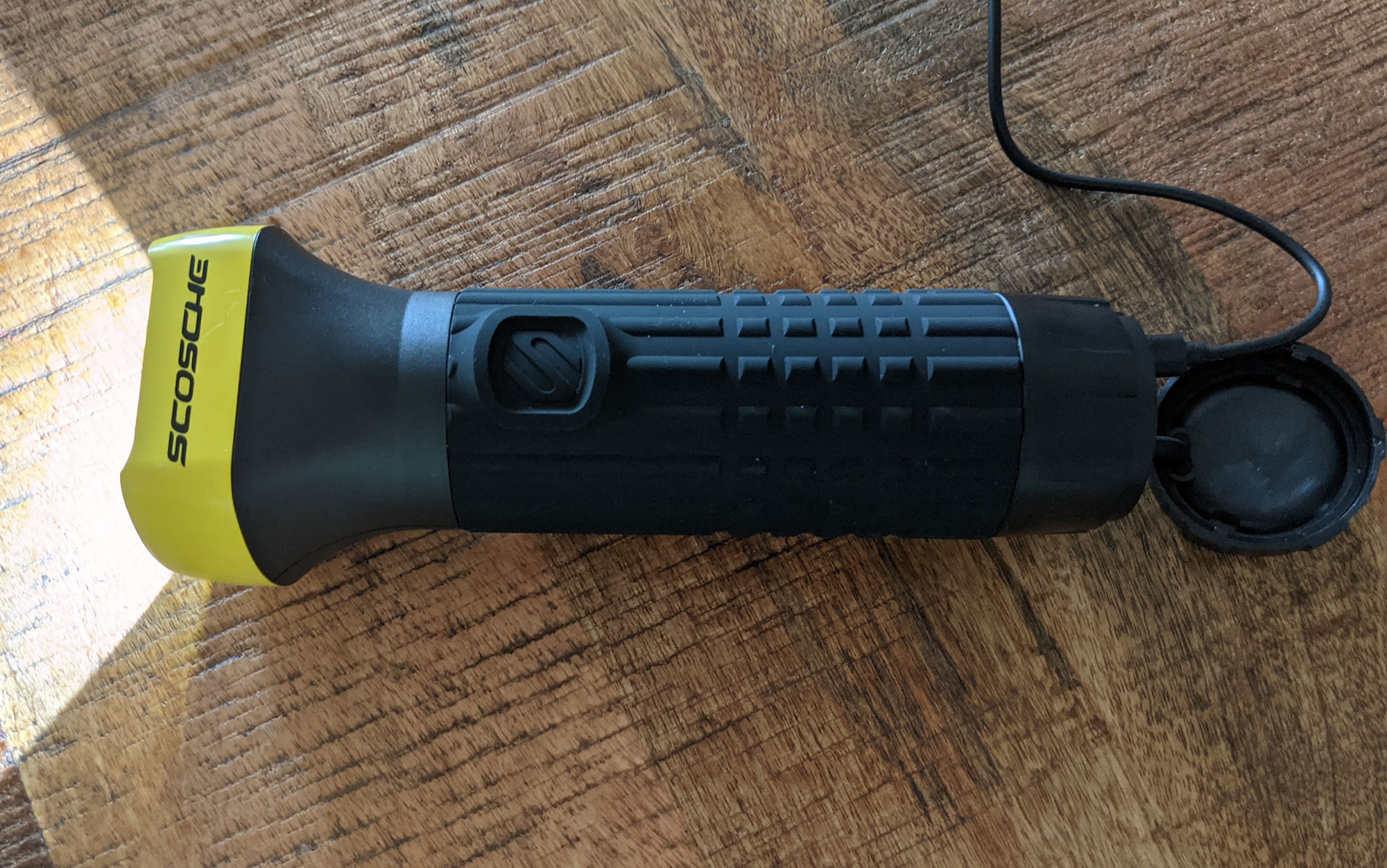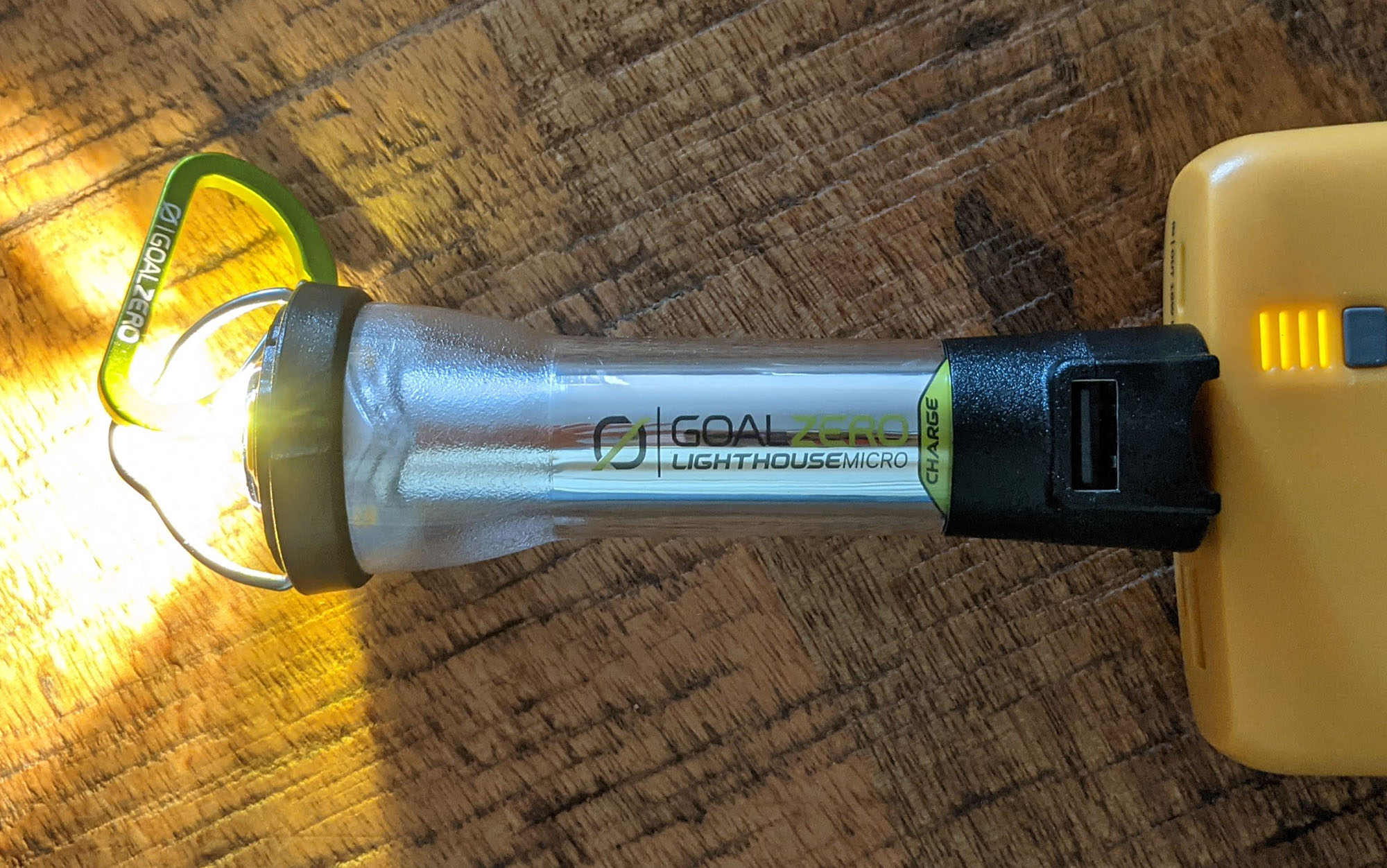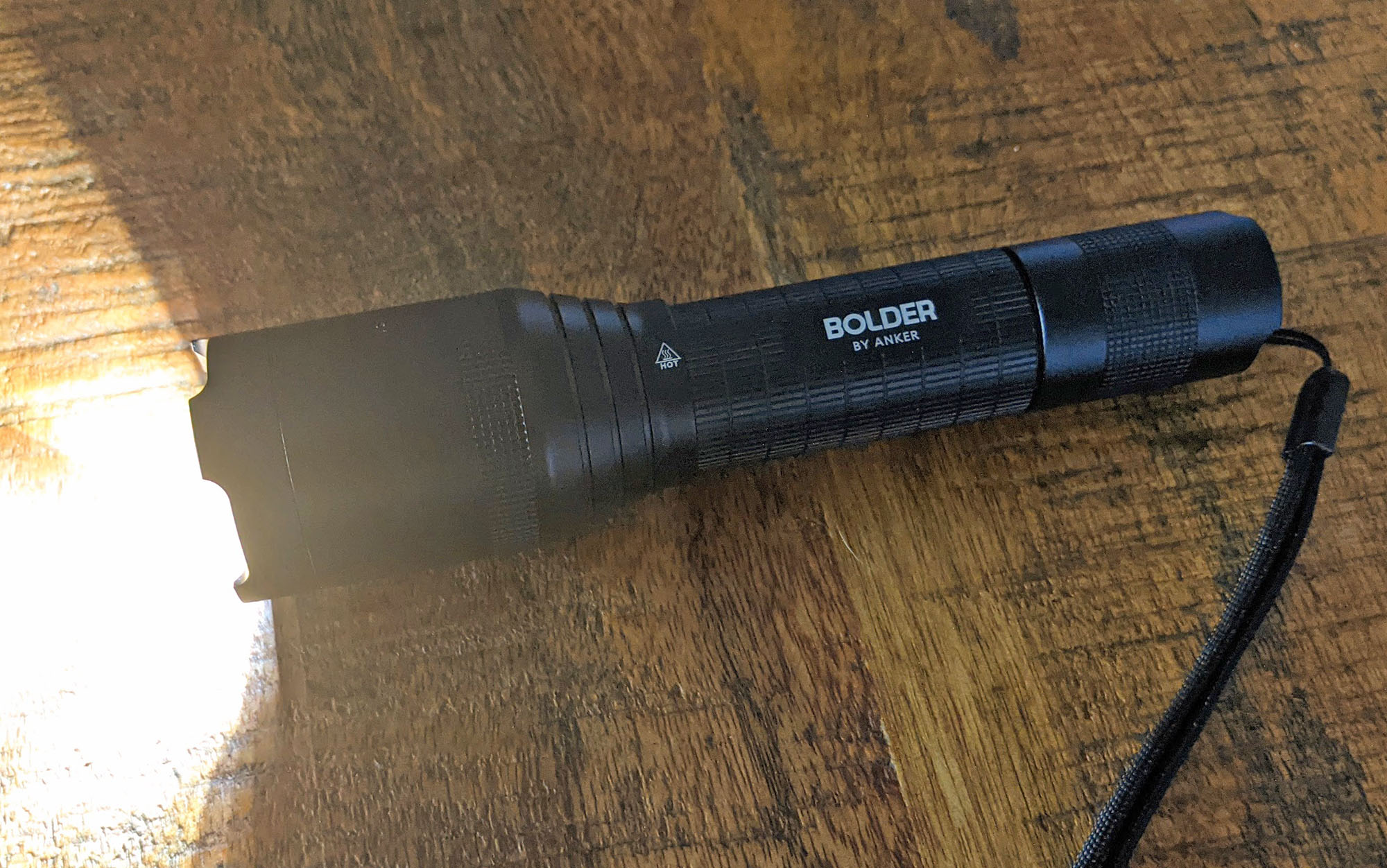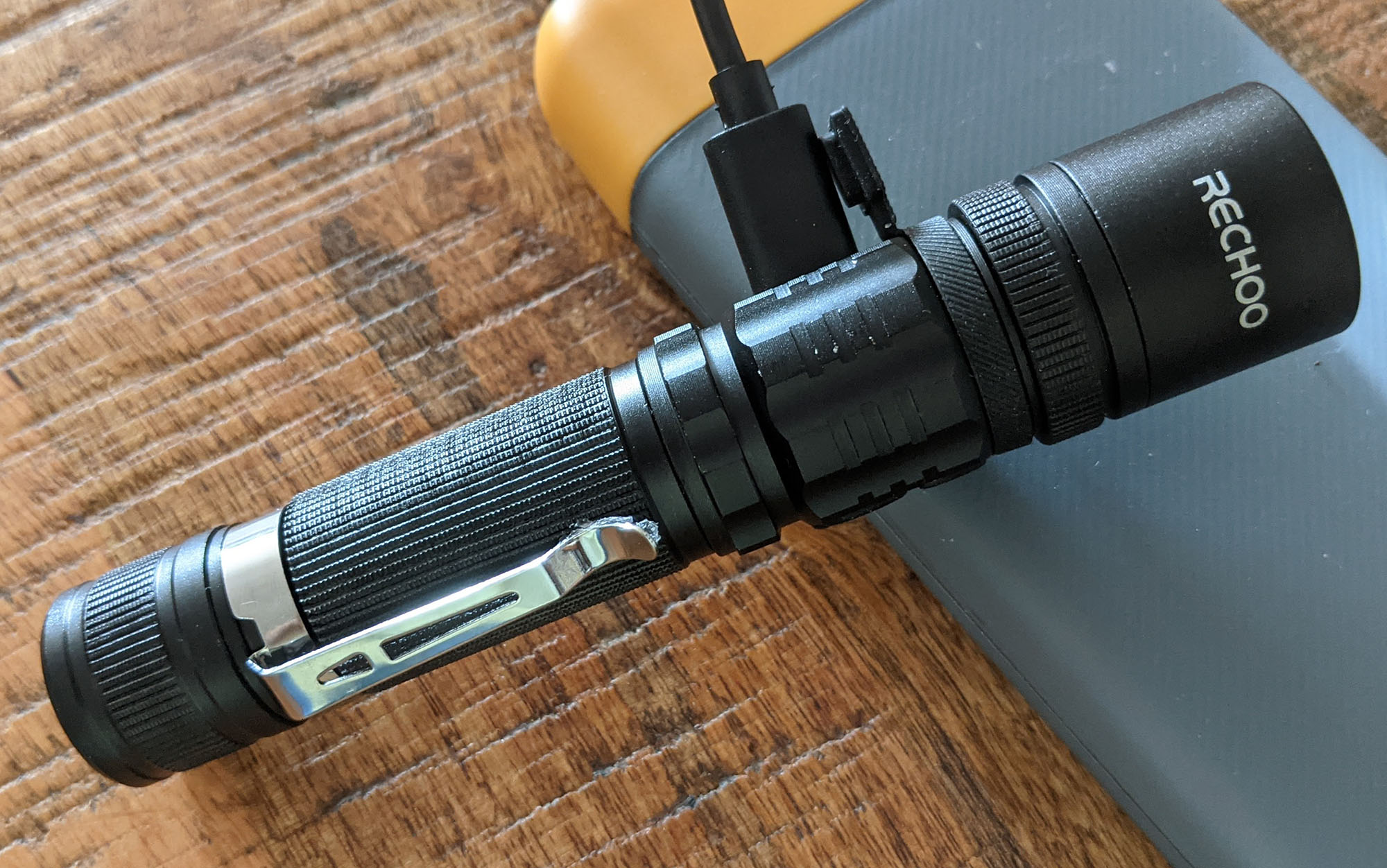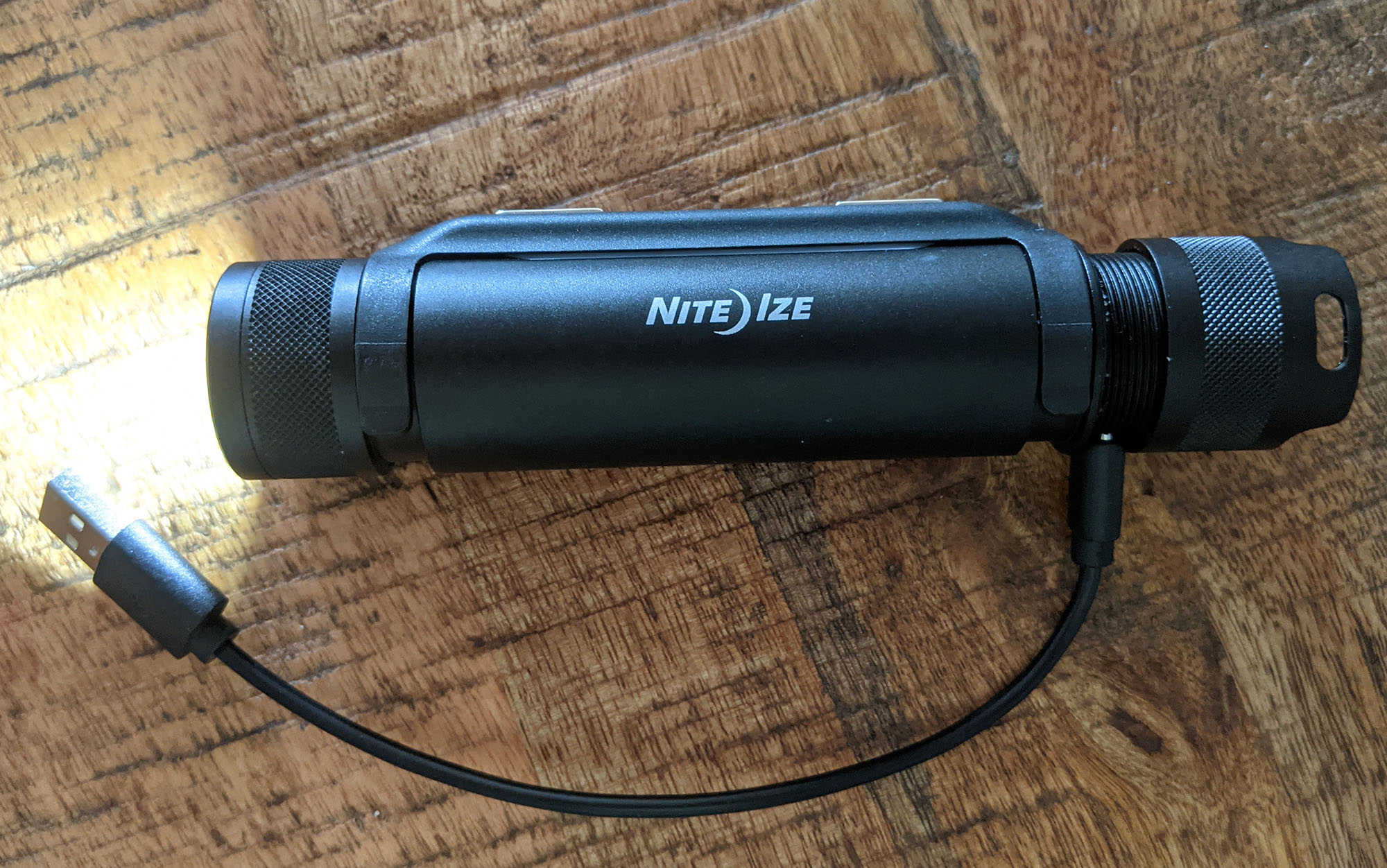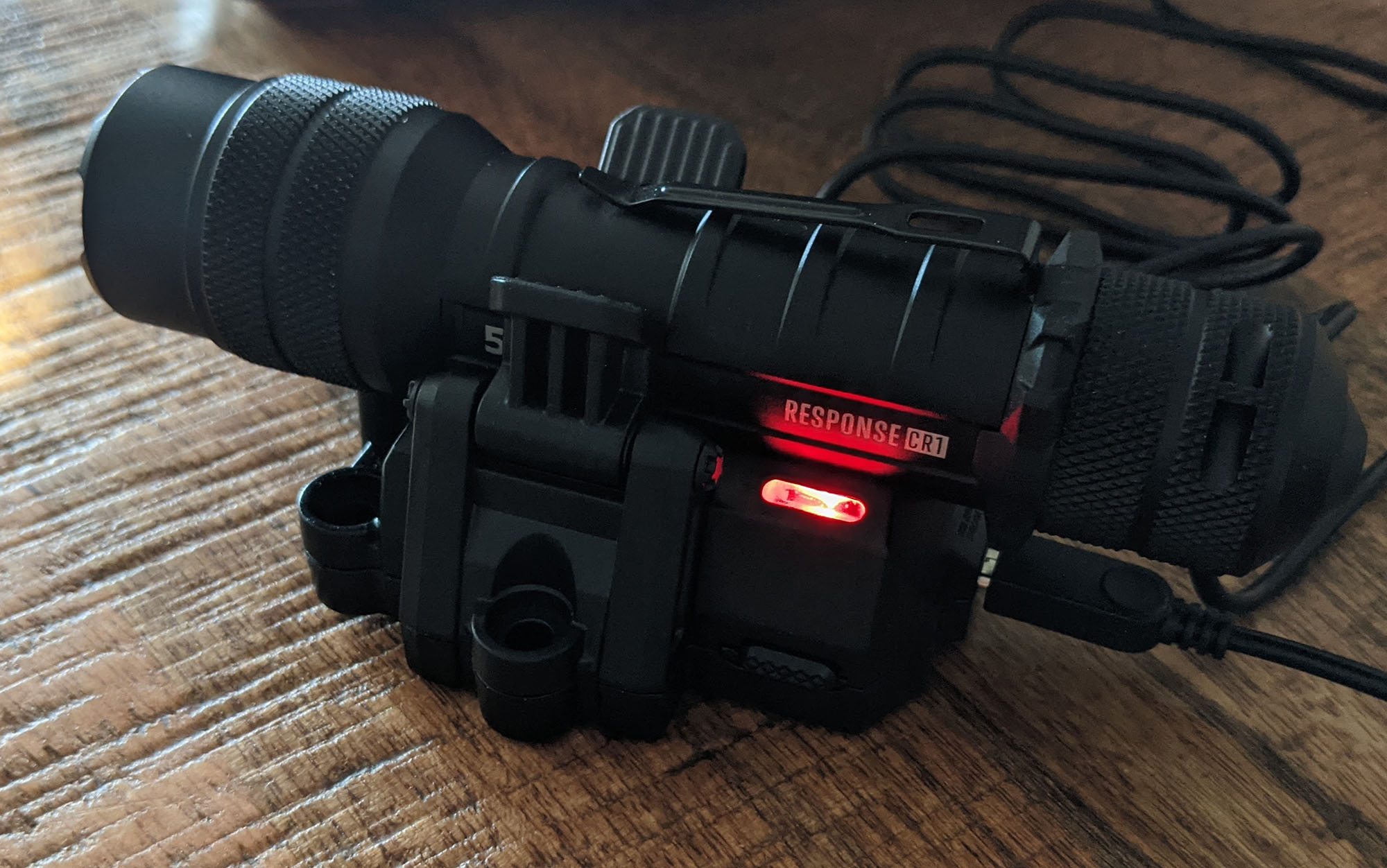We may earn revenue from the products available on this page and participate in affiliate programs. Learn More ›
Published Jun 26, 2023 1:11 PM
With battery packs and solar generators becoming increasingly common gear items in our emergency and outdoor kits, the switch to rechargeable flashlights is inevitable. Why fiddle around with finding four partially charged AAA batteries when you can just plug in your flashlight using a common USB cord? To help you upgrade to one of the best rechargeable flashlights, I checked out seven different models in a range of budgets and lumens to see which would work best across a range of scenarios.
How I Tested the Best Rechargeable Flashlights
To test the best rechargeable flashlights I called in models from Nite Ize, Goal Zero, Cyclops, Anker, Rechoo, 5.11, and Scosche. I then independently checked their weight, length, and run time (at the highest brightness setting). I also tested each in an enclosed pitch-black room to see what kind of brightness it produced. I looked at each flashlight’s waterproof or water resistance rating, as well as other features that could be useful in an emergency scenario. Finally, I considered price and ease of recharging.
For more testing on flashlights, check out our reviews of the best flashlights and the best flashlights for hunting.
Best Rechargeable Flashlights: Reviews & Recommendations
Brightest: Cyclops FX1200
Key Features
- Lumens: 1200
- Weight: 8.8 ounces (claimed); 6.6 ounces (measured)
- Waterproof Rating: IPX4
Pros
- Very bright
- Simple to use
- Affordably priced
Cons
- Cover to charging port can break off
- Cannot be used to charge other devices
For plenty of people, the best rechargeable flashlight is going to be the brightest rechargeable flashlight. If that’s you, then the Cyclops FX1200, with 1200 lumens, is for you. It’s also an affordable choice that’s reasonably easy to operate and charge (although I did struggle with switching between settings without inadvertently setting off the strobe function).
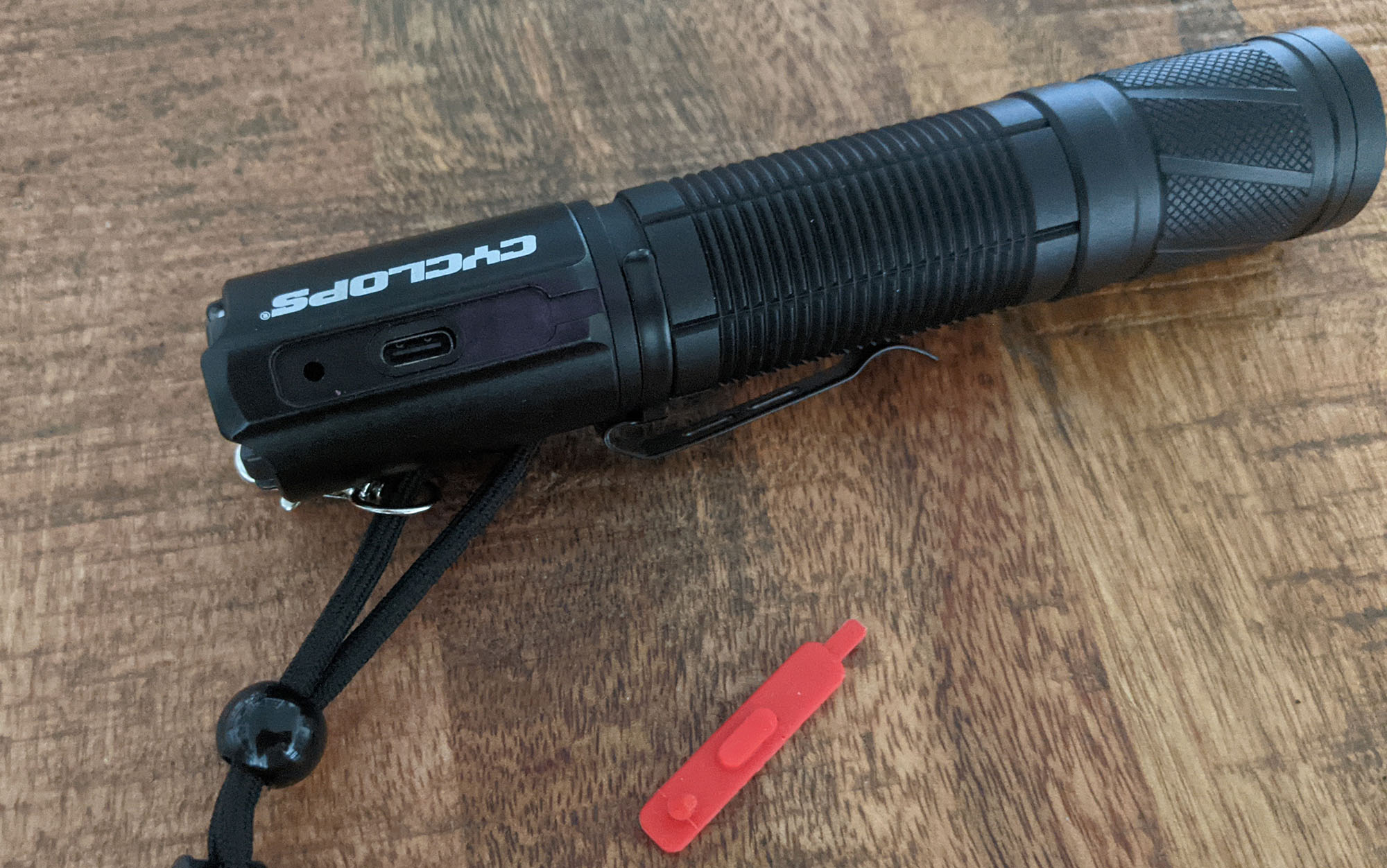
One issue with this flashlight is the silicon cover over the USB-C charging port. The first time I went to use it, the cover came off entirely and I was not able to re-secure it. For emergency use, this defect is only a minor problem but it becomes much more serious if you are using a flashlight in the dirt and grime of camping or if you are in any kind of inclement weather.
Best for Cars: Scosche Powerup 600 Torch
Key Features
- Lumens: 300
- Can be used to charge other devices
- Weight: 23.5 ounces (claimed); 16 ounces (measured)
- Waterproof Rating: IP65
Pros
- Capable of jumpstarting gas engines up to eight cylinders
- Carrying case stores both flashlight and jumpstart cables
- Serves as a backup battery pack with 29.6Wh
Cons
- Low light output
- May need a second flashlight on hand to use the car jumper feature
- Light lasted for less time during testing than expected
If you’re looking for a rechargeable flashlight to store in your car, the multi-purpose Scosche Powerup 600 Torch is an excellent option. While it doesn’t have the brightness or the range of some of the other picks on this list, it’s other functions more than make up for it. It comes with a cigarette adapter so that it can be recharged in virtually any car (even older models), and its USB output port means that it can be used to charge other devices as well.
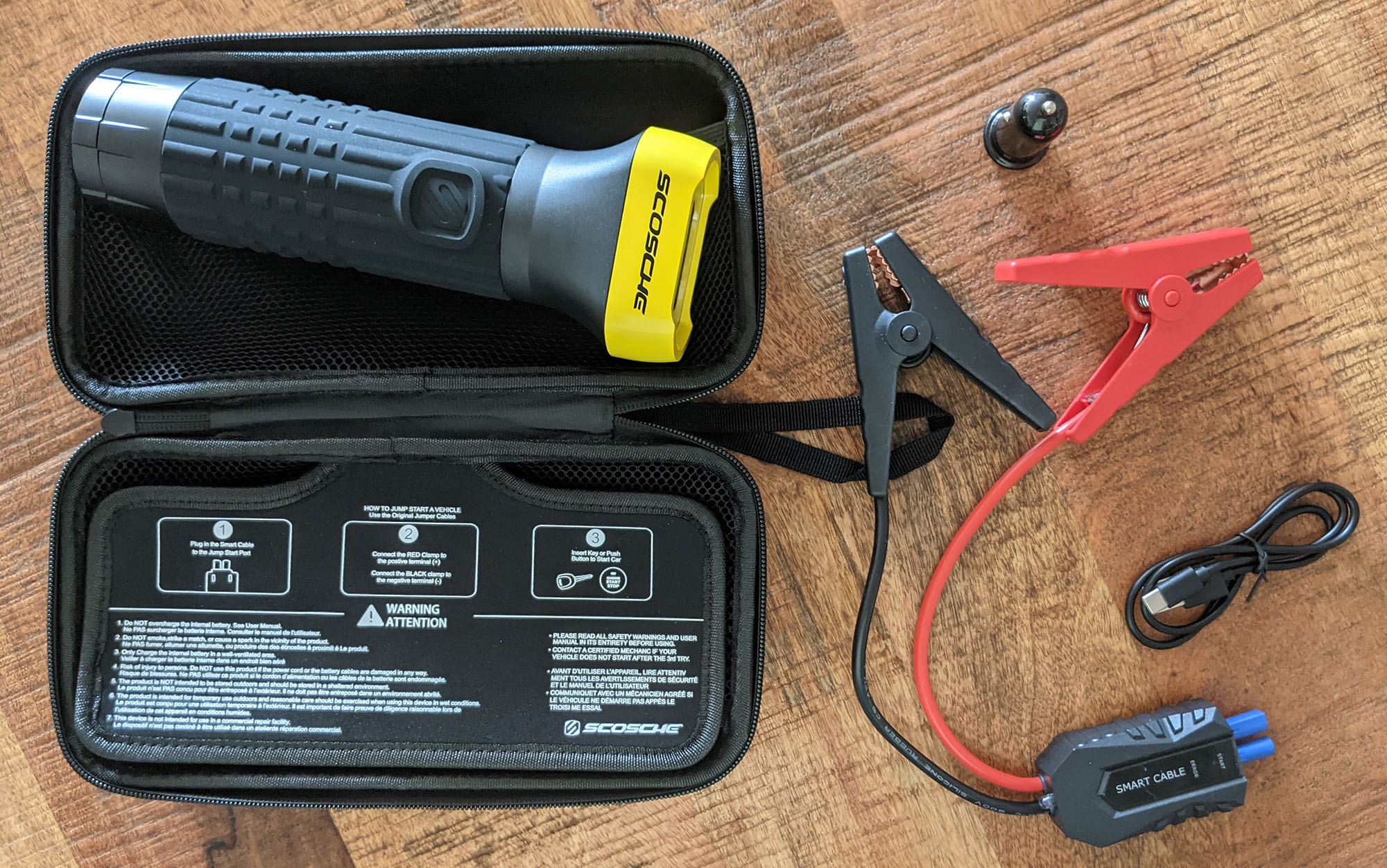
But even better is that the Scosche Powerup 600 Torch can actually help get your car going again. The case holding the flashlight comes with a smart cable attached to jumper cables. Simply plug the smart cable into the jumpstart port on the flashlight, attach the correct cables to your battery terminals, and start your car. (The carrying case also includes easy-to-follow directions).
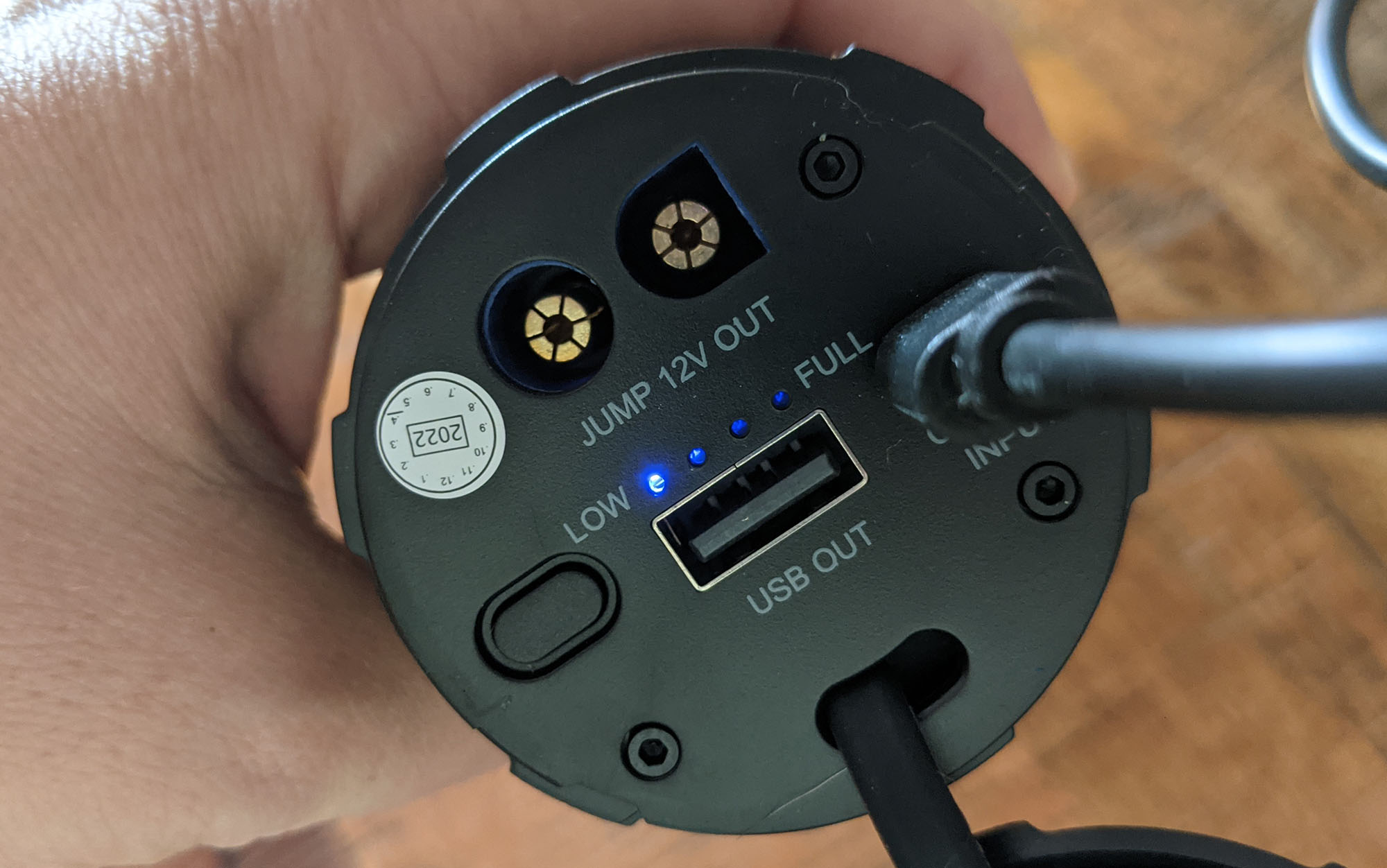
The biggest challenge with this rechargeable flashlight is that since it will likely sit in your car unused most of the time, it may start to lose its charge. Scosche recommends charging it up every six months, something you can do in your car using the provided cigarette port adapter. I also found during testing that while this flashlight lasted for a significant period of time (7 hours), it lasted for less time than much smaller flashlights with higher lumen outputs.
Best for Backpacking: Goal Zero Lighthouse Micro Charge
Key Features
- Lumens: 120
- Weight: 3.1 ounces (claimed); 3.1 (measured)
- Waterproof Rating: IPX6
Pros
- Lightweight
- Very waterproof
- Can be used as a flashlight, lantern, or external battery
- Affordable
- Long last light
Cons
Let’s start with the con of the Goal Zero Lighthouse: It’s not particularly bright. If you need to follow a blood trail or do some serious night hiking, you’d be better off with one of the best headlamps. But if you just want to grab an easy light source go to the bathroom or find something on the inside of your tent, it’s plenty of light.
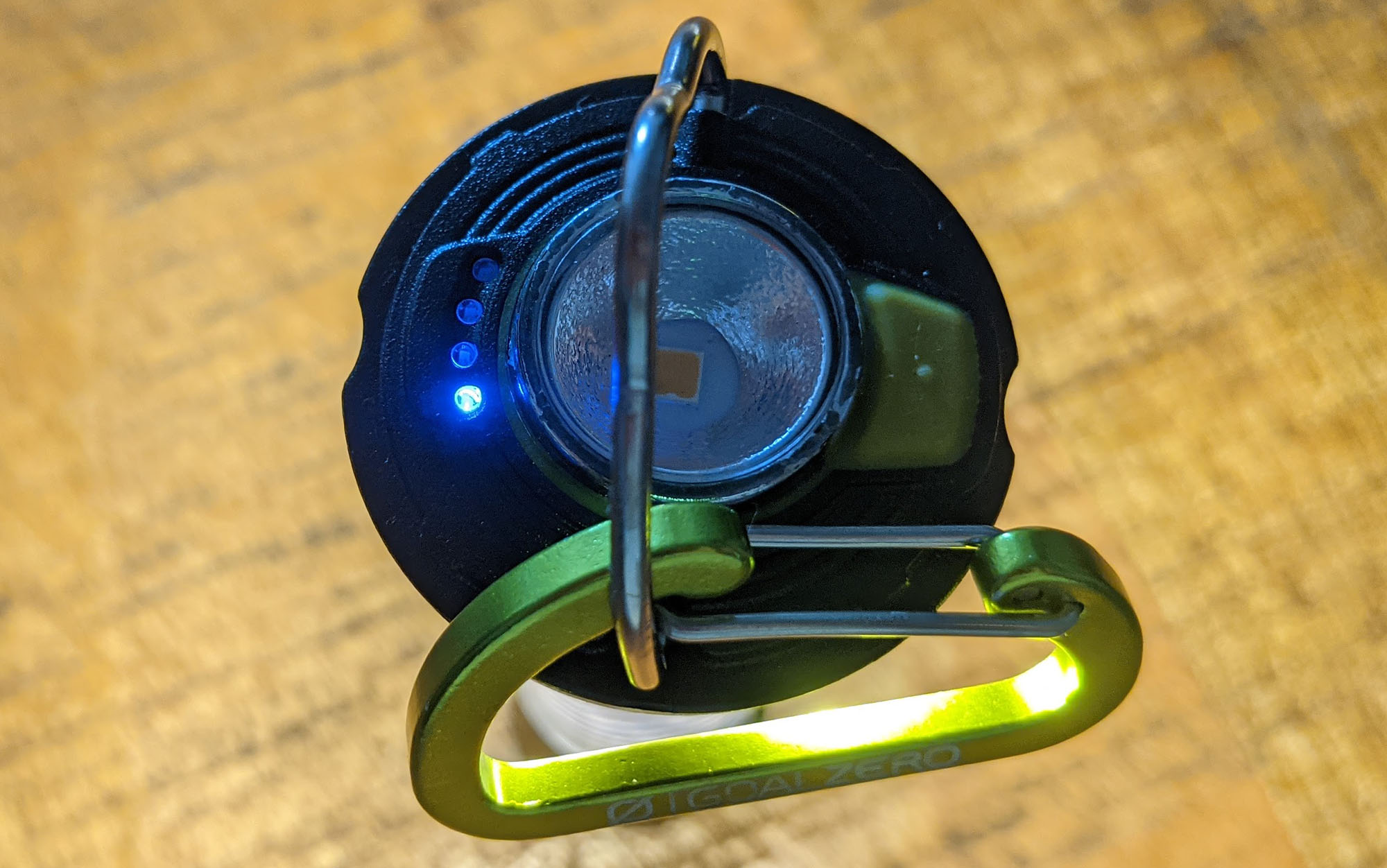
Even better, it has a lantern setting that can be split in half. That way you can light up either the entire interior or, if you’re sharing with your partner, just your half while they get a little shut eye. That’s a lot of functionality for just over 3 ounces.
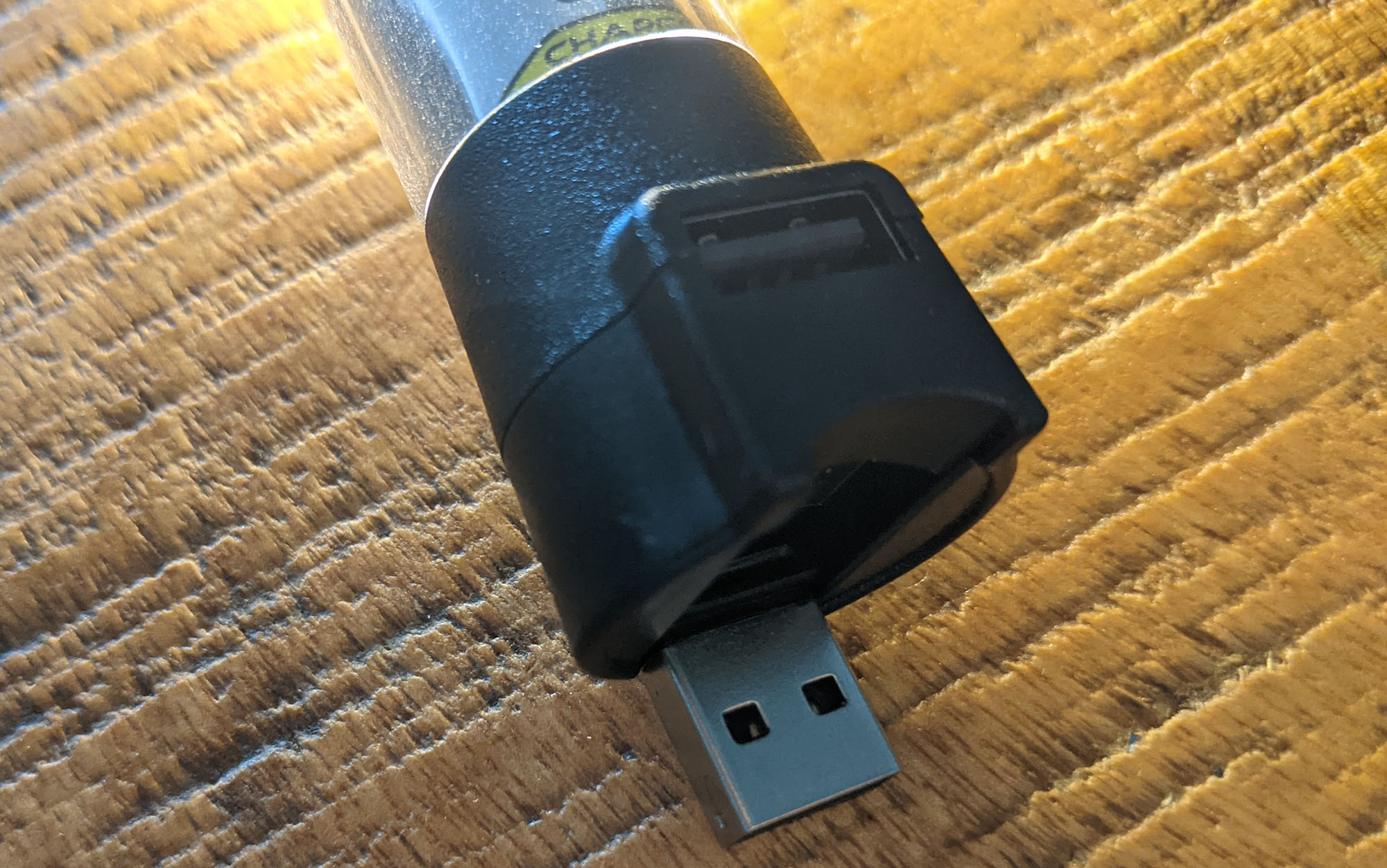
At 12 hours, this flashlight has one of the longest run times of anything I looked at—you could easily go your entire trip without having to recharge it. In fact, you could use it to power up some of your other devices as the internal battery has enough juice to power up a phone about once.
Best Value: Anker Bolder LC90
Key Features
- Lumens: 900
- Weight: 6.2 ounces (claimed); 8.1 ounces (measured)
- Waterproof Rating: IPX5
Pros
- Very bright
- Affordably priced
Cons
- Micro USB charging port
- Shorter battery life than others in my test
- Cannot be used to charge other devices
It makes sense that the best value rechargeable flashlight is made by the same company that makes one of the best solar generators: Anker. Like the Rechoo and the 5.11 Response CR1, this is a pretty basic flashlight. One click goes on; one click goes off. Holding down the power button sets it up to go through a series of various flashing patterns (try to avoid this). That’s basically it.
I liked that this one had both a very bright setting and a fairly dim setting that were easy to maintain once you had clicked your way through to them. It had a great hand feel and, while it warmed up noticeably on the highest setting, it was never uncomfortable. It’s also very reasonably priced. My only gripe is that it has a Micro USB charging port, an increasingly uncommon cord to have in your arsenal if you misplace the cord the flashlight comes with.
Best Budget: Rechoo S3000L
Key Features
- Lumens: 600
- Weight: 5.6 ounces (claimed); 4.8 ounces (measured)
- Waterproof Rating: IP65
Pros
- Affordably priced
- Plenty bright enough for most purposes
- Easy to use
Cons
- Fewer features than other flashlights we looked at
- Cannot be used to charge other devices
If you’re looking for something simple and affordable to have as part of your emergency backup kit, the Rechoo S3000L is a great option. It was one of the most affordable rechargeable flashlights I found for testing, had plenty of lumens to light up my testing room, and was simple to use and recharge. It even uses the more common USB-C for recharging, which will make your life a whole lot easier when you need to find a spare cord during a blackout.
Campers should note that this flashlight is only rated to IP65 for water resistance. That means it’s fine to take out into a sprinkle when you need to hit the restroom, but if you leave it out overnight during a rainstorm you may find that it stops working. I also noted during testing that this rechargeable flashlight heated up somewhat quickly.
Best Magnetic: Nite Ize Rechargeable Utility
Key Features
- Lumens: 850
- Weight: 5.6 ounces (claimed); 5.6 ounces (measured)
- Waterproof Rating: IPX4
Pros
- Doubles as a lantern and a flashlight
- Good handfeel
- Removable magnetic strip provides additional versatility
Cons
- Sometimes difficult to toggle through settings
- Cannot be used to charge other devices
The Nite Ize Rechargeable Utility is a versatile flashlight. It can be mounted via its magnetic strip to any metal surface. It has a light output of 850 lumens (on high) or 90 lumens (on low) as well as a red LED in the lantern function. This is a great choice to stash in an easy grab spot in your garage or other dark corner of your house where a mountable flashlight would come in handy.
While I appreciated how easy it was to charge up this battery and apply the magnetic strip to various surfaces, toggling between the different settings was more difficult than I expected. Similar to other rechargeable flashlights, the Nite Ize depends on a series of quick or slow button clicks to change between different settings. While I found this wasn’t the only flashlight that I struggled with this feature on, it was the only one where I struggled to turn the flashlight off entirely. This is in part due to a lockout mode feature that is fairly sensitive and turns on easily. To disengage it, simply hold the button down for five seconds.
Most Versatile Power Source: 5.11 Response CR1
Key Features
- Lumens: 549
- Weight: 6.8 ounces (claimed); 6.8 ounces (measured)
- Waterproof Rating: IPX4
Pros
- Can be powered using disposable batteries
Cons
- Requires a wall mount to use the rechargeable battery
- Alternate battery option requires less common CR123A batteries
- Expensive
- Cannot be used to charge other devices
The 5.11 Response CR1 was the most expensive rechargeable flashlight, even more expensive than the Scosche flashlight (which can jumpstart a car). Unfortunately, unlike the Scosche, there weren’t as many features here to justify the extra price. This flashlight cannot be used as an external battery. It was not noticeably brighter during testing than other high-lumen options I tested. It did have a longer run time, but this was in part due to a feature that caused the flashlight to switch to a dimmer setting when the batteries were low (and intermittently power off).
One feature that it did have that I wished it didn’t was a wall mount. While other rechargeable flashlights could be recharged with whatever USB-C or micro USB cord you have on hand, the 5.11 Response CR1 has a special mount that must be used. This may be useful for individuals who want to simply store their flashlight on the mount at all times, if you’re planning to use your rechargeable flashlight in an emergency or camping scenario it makes it somewhat less versatile.
While I appreciate that there is an option to use disposable batteries with this flashlight, the only one in my test where that was possible, this option required both CR123A batteries, which are somewhat more difficult to find than AA or AAA, and a special cartridge separate from the rest of the unit.
How to Choose the Best Rechargeable Flashlight
Flashlights might seem like simple tools, but there’s a lot to consider when you’re choosing the best rechargeable flashlight. Manufacturers tailor their flashlights for specific purposes, and you’ll want to consider the lumens, size, and power source before selecting the best flashlight for you.
Size
When you’re looking at a flashlight, you need to think about how you’ll carry it. Will this be a pocket companion, or will it live in a pack, drawer, or center console? The answer to that question will tell you if you want a small, slim light for your pocket or a larger light.
Use
How you’ll use the flashlight is the most important deciding factor. Is this a general-purpose flashlight for walking the dog and making your way through a dark parking lot? Or, is this a duty light that carries a specific need to identify possible threats at distance or blind attackers at close distance? Is this a light you’ll need to run for more than an hour while you blood trail and drag a deer? Choosing the flashlight that best matches your needs will make sure you get years of good use out of it.
Recharge Compatibility
Some of the rechargeable flashlights in my test used a common USB-C or micro USB cord, but others relied on specialized cords. Consider how difficult it will be to find the recharging apparatus in an emergency scenario (and what cords are most common in your home) before making a final purchasing decision.
Waterproof Rating
The water and dust IP ratings provide consumers with test-based information on how well a product can withstand the elements. This rating includes a separate grade for both the dust resistance (first digit after the IP) and the water resistance (second digit after the IP). (An “X” in place of either of these ratings means that it was not evaluated in this area). A handy chart can be found here for further information.
FAQs
Q: Do LED flashlights get hot?
High-output flashlights get hot even if they use an LED. But, LED flashlights below 500 lumens won’t get noticeably hot.
Q: Are expensive flashlights worth it?
Like all things, you get what you pay for in flashlights. A $300 premium light will have features that budget lights cannot match. But, the real question is, how much performance do you need for your intended use? If you just need a basic light that won’t see hard use, then a $50 to $100 flashlight will serve you very well.
Q: How many lumens is enough for a flashlight?
For a micro flashlight, 300 lumens is very good. But, full-size flashlights don’t get exciting until they reach 1,000 lumens with long run times.
Q: Are rechargeable batteries good for flashlights?
Rechargeable batteries are great for flashlights, allowing you to take advantage of a more heavy duty solar generator or power bank setup in an emergency scenario.
Why Trust Outdoor Life?
Since 1898, OL has been a leading authority in testing and reviewing hunting gear, fishing tackle, guns and shooting equipment, and much more. We have more than a century-long history of evaluating products, and we’re now bringing that expertise to online reviews. Our editors are experienced outdoorsmen and women, and most importantly, we’re trained journalists. We prioritize field testing and objective data when reviewing products. We conduct interviews with gear manufacturers and engineers as well as outdoor experts so that our readers have an understanding of how and why a product works—or doesn’t.
Advertising does not influence our gear reviews and it never will. While we always focus our coverage on standout products—because we want our readers to be aware of the latest and greatest gear—we also cover the flaws and quirks of any given product.
Final Thoughts on the Best Rechargeable Flashlights
With the impressive upgrades that have been made in lithium batteries in recent years, there’s never been a better time to upgrade to a rechargeable battery. Our picks were selected based on a number of criteria, ease of use, charge and run time, and lumens. Whatever your needs and budget, you’ll find a product to light up your next camping trip or emergency power outage.

